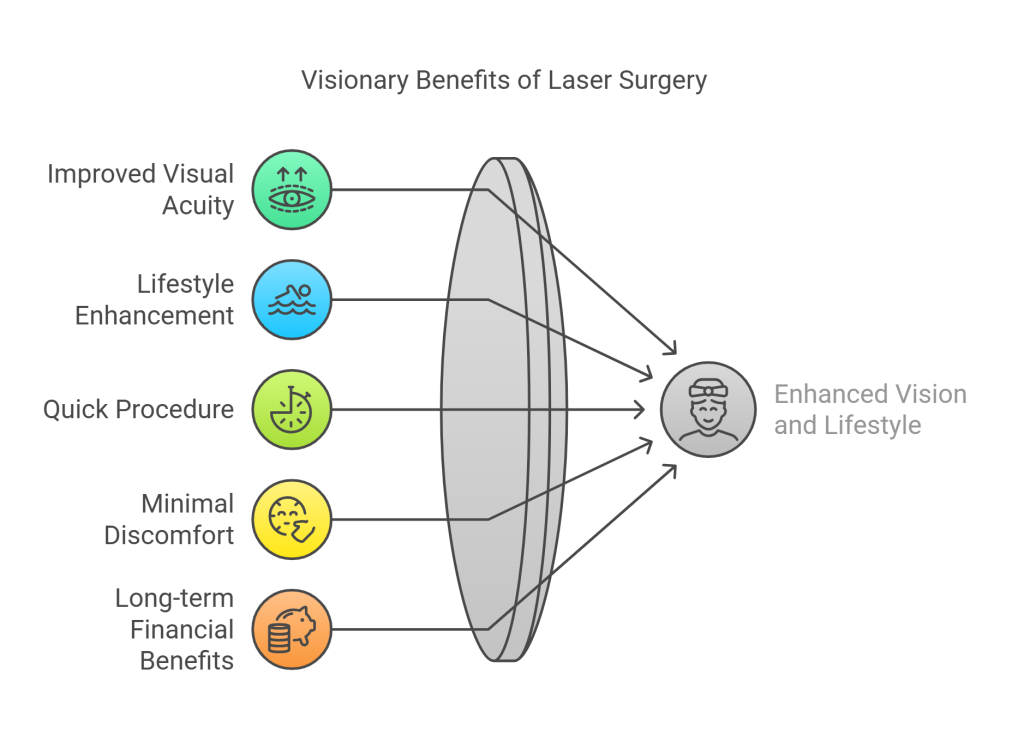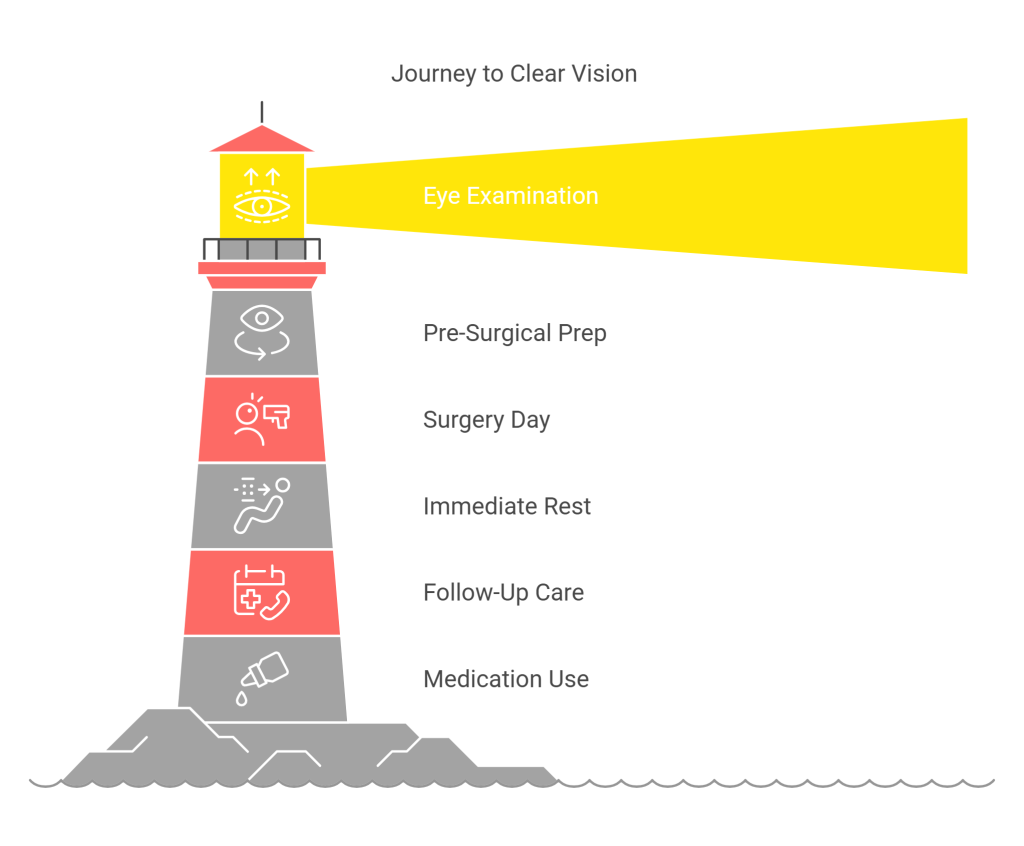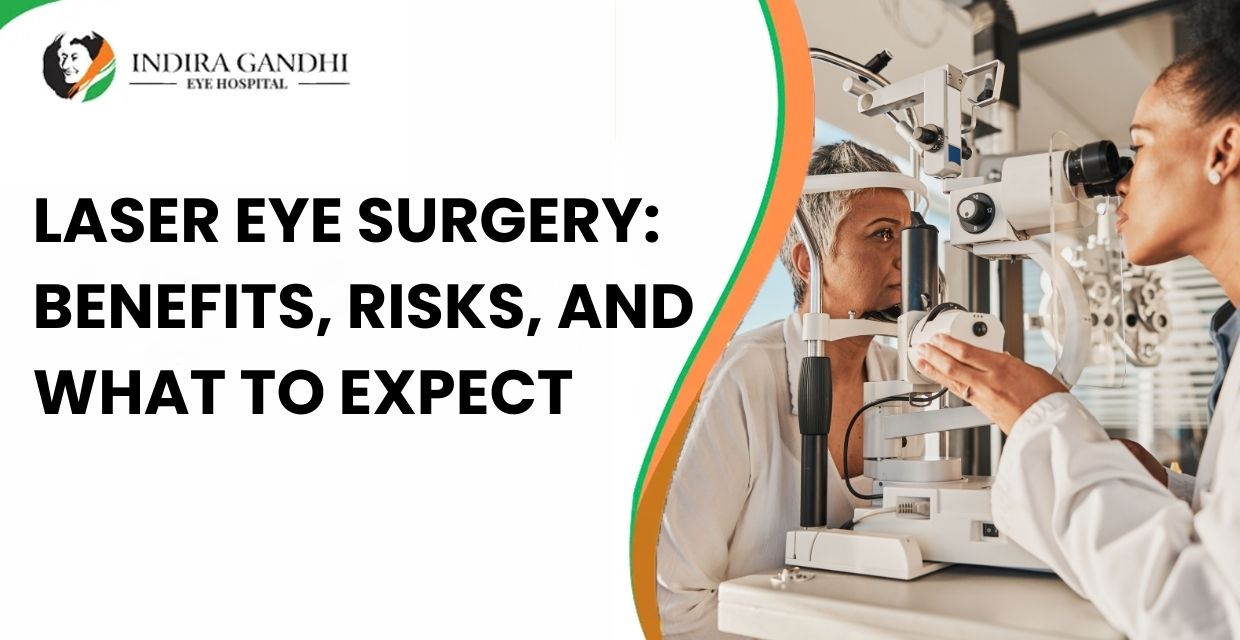|
Getting your Trinity Audio player ready...
|
Laser eye surgery, particularly LASIK, has become a cornerstone in refractive vision correction, favored by millions for its ability to significantly improve eyesight. This detailed guide explores the substantial benefits, potential risks, and what patients can typically expect before, during, and after undergoing laser eye surgery.
Introduction to Laser Eye Surgery
Laser eye surgery refers to medical procedures that correct vision by reshaping the cornea using precise laser technology. There are several types of laser eye surgery, including LASIK (Laser-Assisted In Situ Keratomileusis), PRK (Photorefractive Keratectomy), and LASEK (Laser-Assisted Subepithelial Keratectomy). These procedures are designed to address common vision problems such as myopia (nearsightedness), hyperopia (farsightedness), and astigmatism, offering a promising alternative to eyeglasses and contact lenses.
Benefits of Laser Eye Surgery

Improved Visual Acuity
One of the most compelling advantages of laser eye surgery is the improvement in visual acuity it offers. Most patients achieve 20/25 vision or better, which is sufficient for most activities, including driving. The precision of modern laser technology has made this possible, with a high success rate that underscores its reliability as a vision correction method.
Lifestyle Enhancement
Imagine waking up in the morning and seeing the world clearly without reaching for your glasses. For many, this is the primary motivation for choosing laser eye surgery. Activities such as swimming, running, and other sports become more accessible and enjoyable when unencumbered by corrective eyewear.
Quick Procedure with Minimal Discomfort
Laser eye surgery is known for its quick turnaround time. The surgery itself is quick, typically lasting only about 10 minutes for both eyes, and it involves minimal discomfort. The recovery period is short, with many patients reporting significant improvements in vision within 24 hours after the procedure.
Long-term Financial Benefits
While the upfront cost of laser eye surgery can be significant, it can be cost-effective in the long run. By reducing or eliminating the need for eyeglasses and contact lenses, along with their associated maintenance costs, the investment in laser eye surgery can pay dividends over time.
Risks and Complications of Laser Eye Surgery
Despite its high success rate, laser eye surgery carries potential risks and complications that patients must consider:
- Temporary Discomfort and Visual Disturbances: After the surgery, patients might experience mild discomfort, dry eyes, or visual disturbances such as glare, halos, and double vision. These symptoms typically resolve within a few weeks to months.
- Serious Complications: In rare cases, patients might experience severe complications such as infections, significant undercorrections or overcorrections, and flap complications in procedures like LASIK. Such complications may necessitate further surgery and could lead to permanent vision issues.
- Risk of Dry Eyes: One of the common side effects post-surgery is dry eyes, which, for some, can be severe and require ongoing treatment.
Determining Candidacy for Laser Eye Surgery
Not everyone is a suitable candidate for laser eye surgery. Suitable candidates typically include:
- Adults over 18: The patient’s vision must be stable, typically for at least two years.
- Healthy Corneal Thickness: This is crucial for the reshaping process involved in LASIK and similar procedures.
- Absence of Eye Diseases: Conditions like severe dry eyes, keratoconus, or corneal diseases can disqualify a candidate.
Prospective patients should undergo a thorough eye examination by a qualified ophthalmologist to determine their suitability for laser eye surgery. This assessment includes detailed mapping of the cornea and a comprehensive review of the patient’s overall eye health.
What to Expect with Laser Eye Surgery

Before the Procedure
Preparation for laser eye surgery involves several critical steps:
- Detailed Eye Examination: To map the eye’s surface and create a precise plan for the reshaping of the cornea.
- Pre-Surgical Instructions: Patients may need to refrain from wearing contact lenses and switch to glasses several weeks before the surgery to stabilize the cornea.
During the Procedure
The procedure is performed under local anesthesia using eye drops to numb the area. The surgeon creates a thin flap in the cornea, lifts it, and then reshapes the underlying corneal tissue using an excimer laser. The corneal flap is then laid back in place where it heals over time without the need for stitches.
After the Procedure
Post-surgery care is crucial for a smooth recovery and optimal outcomes:
- Immediate Rest: Patients are advised to rest and avoid any strenuous activities for at least a few days post-surgery.
- Follow-Up Appointments: Several follow-up visits are necessary to monitor the healing process and ensure the best possible vision outcome.
- Use of Medications: Antibiotic and anti-inflammatory eye drops are prescribed to prevent infection and reduce inflammation during the recovery phase.
Choosing the Right Hospital and Surgeon
When considering laser eye surgery, choosing the right clinic and surgeon is crucial. Factors to consider include the surgeon’s qualifications, experience, and the technology used in the clinic. It is advisable to select a reputable clinic, such as one of the best eye hospitals in India, known for its high standards of care and successful surgical outcomes.
Alternatives to Laser Eye Surgery
For those who are not suitable candidates for laser eye surgery, other vision correction options include implantable contact lenses (ICL) and refractive lens exchange. Non-surgical alternatives such as orthokeratology (Ortho-K) are also available, where specially designed contact lenses reshape the cornea overnight.
Conclusion
Laser eye surgery offers a viable and effective solution for those looking to correct their vision and potentially eliminate their dependence on glasses or contact lenses. However, like any medical procedure, it comes with risks that should be carefully considered. Consulting with a trusted ophthalmologist and choosing a reputable clinic are crucial steps in ensuring the best outcomes from laser eye surgery. Whether you are exploring LASIK or any other laser vision correction procedure, understanding the benefits, risks, and what to expect can help you make an informed decision.
This comprehensive guide aims to provide prospective patients with the knowledge they need to explore laser eye surgery as a potential solution for their vision correction needs.












